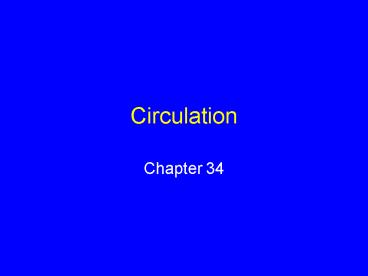Circulation - PowerPoint PPT Presentation
1 / 14
Title:
Circulation
Description:
Human Heart Is a. Double Pump. Partition separates heart into left and right sides ... heart. Systemic Circuit. Longer loop that carries blood to and from body ... – PowerPoint PPT presentation
Number of Views:106
Avg rating:3.0/5.0
Title: Circulation
1
Circulation
- Chapter 34
2
Circulatory System
- Accepts oxygen, nutrients, and other substances
from the respiratory and digestive systems and
delivers them to cells - Accepts carbon dioxide and wastes from cells and
delivers them to respiratory and urinary systems
for disposal
3
Functional Connections
food, water intake
oxygen intake
DIGESTIVE SYSTEM
RESPIRATORY SYSTEM
elimination of carbon dioxide
nutrients, water, salts
carbon dioxide
oxygen
CIRCULATORY SYSTEM
URINARY SYSTEM
water, solutes
elimination of food residues
rapid transport to and from all living cells
elimination of excess water, salts, wastes
4
Functions of Blood
- Transports oxygen and nutrients to cells
- Carries carbon dioxide and wastes away from cells
- Helps stabilize internal pH
- Carries infection-fighting cells
- Helps equalize temperature
5
Blood Volume and Composition
- Plasma
- 50-60 percent of volume
- Water, plasma proteins, dissolved ions and
molecules - Cellular portion
- 40-50 percent of volume
- Red cells, white cells, and platelets
6
Erythrocytes (Red Cells)
- Most numerous cells in the blood
- Transport oxygen and carbon dioxide
- Colored red by oxygen-binding pigment
(hemoglobin) - Have no nucleus when mature
7
Platelets
- Membrane-bound cell fragments
- Derived from megakaryocytes, which arise from
stem cells - Release substances that initiate blood clotting
8
Human Heart Is a Double Pump
- Partition separates heart into left and right
sides - Each pumps blood through a different circuit
9
Pulmonary Circuit
right pulmonary artery
left pulmonary artery
- Short loop that oxygenates blood
capillary bed of left lung
capillary bed of right lung
pulmonary trunk
(to systemic circuit)
(from systemic circuit)
pulmonary veins
heart
lungs
10
Systemic Circuit
capillary beds of head and upper extremities
aorta
(to pulmonary circuit)
(from pulmonary circuit)
- Longer loop that carries blood to and from body
tissues
heart
capillary beds of other organs in thoracic cavity
capillary bed of liver
capillary beds of intestines
11
Four Chambers
- Each side has two chambers
- Upper atrium
- Lower ventricle
- Valves between atria and ventricles
12
Direction of Blood Flow
- Superior and inferior vena cava
- Right atrium
- Right ventricle
- Pulmonary artery
- Pulmonary veins
- Left atrium
- Left ventricle
- Aorta
13
Cardiac Cycle
- Contraction phase is systole
- Relaxation phase is diastole
Mid-to-late diastole .
Early diastole
Ventricular systole
14
Conduction and Contraction
SA node
- SA node in right atrium is pacemaker
- Electrical signals cause contraction of atria
- Signal flows to AV node and down septum to
ventricles































